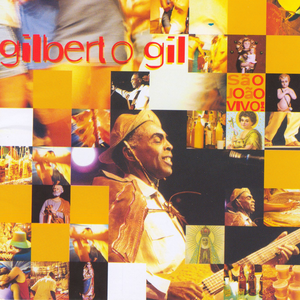He began his career as a bossa nova musician, but soon began writing songs that reflected a new focus on political awareness and social activism, along with fellow singer Caetano Veloso. In the 1970s, Gil added new elements of African and North American music to his already broad palette, and continued to release a steady stream of albums, including Realce and Refazenda. João Gilberto recorded Gil's "Eu Vim da Bahia" ("I Came from Bahia") on his classic João Gilberto LP.
In 1969, Gil and Veloso, whose status in Brazil was, and is, equivalent to that of John Lennon and Paul McCartney in the English-speaking world, were arrested by the military government of Brazil for anti-government activities. Upon their release, the pair both moved to London. Gil began playing with groups like Yes, Pink Floyd and The Incredible String Band, while continuing his solo career. In the 1970s, he toured the US and recorded an English-language album. He worked with Jimmy Cliff and released in 1980 a cover of "No Woman, No Cry" (Bob Marley & the Wailers) that was a massive hit and introduced reggae to Brazil.
Gil continued recording, performing and involving himself in various social causes, and was eventually elected a city councillor in his home town Salvador in 1989. His 1993 album with Caetano Veloso, Tropicália 2, featured a cover of a Jimi Hendrix song, "Wait Until Tomorrow", and is regarded as one of his finest efforts since the late 1960s.
When President Lula da Silva took office in January 2003, he chose Gil to serve as Brazil's new Minister of Culture, a post he held until 2008. While minister, Gil released his songs "Refazenda", "Rebento" and "Refavela" under the Creative Commons Sampling License.
In May 2005 Gil was awarded the Polar Music Prize in Stockholm, Sweden. He was the first Latin American recipient of the annual award, which was given to him by the King of Sweden. Gil also performed four songs in an outdoors concert the day before the award show and again at the show with only two songs, accompanied by Jimmy Cliff.
In September 2005 he was awarded the Légion d'honneur from the French Government. This coincided with the Année du Brésil en France (Brazil's Year in France).
His daughter Preta Gil is also a musician.
Pau De Arara
Gilberto Gil Lyrics
Jump to: Overall Meaning ↴ Line by Line Meaning ↴
Do meu bodocó
Meu malote era um saco
E o cadeado era o nó
Só trazia a coragem e a cara
Viajando num pau de arara
Eu penei, mas aqui cheguei
Do meu bodocó
Meu malote era um saco
E o cadeado era o nó
Só trazia a coragem e a cara
Viajando num pau de arara
Eu penei, mas aqui cheguei
Trouxe o triângulo
Trouxe o gonguê
Trouxe o zabumba
Dentro do matulê
Xote, maracatu e baião
Tudo isso eu trouxe no meu matulão
Quando eu vim do sertão seu moço
Do meu bodocó
Meu malote era um saco
E o cadeado era o nó
Só trazia a coragem e a cara
Viajando num pau de arara
Eu penei, mas aqui cheguei
Quando eu vim do sertão seu moço
Do meu bodocó
Meu malote era um saco
E o cadeado era o nó
Só trazia a coragem e a cara
Viajando num pau de arara
Eu penei, mas aqui cheguei
Trouxe o triângulo
Trouxe o gonguê
Trouxe o zabumba
Dentro do matulê
Xote, maracatu e baião
Tudo isso eu trouxe no meu matulão
In Gilberto Gil's "Pau de Arara" (which translates to "Donkey's Hitching Post" in English), the singer sings about his journey from the sertão (hinterland) to a new life in the city. He describes how he only brought his courage and determination with him, traveling on a "pau de arara" (a kind of makeshift truck made from planks of wood and used for transportation in rural areas). The singer alludes to the hardships he faced during his journey, but ultimately made it to where he wanted to go. He proudly declares that he also brought along his musical instruments - the triangle, gonguê, and zabumba - and the genres of music he loves, like xote, maracatu, and baião.
The song's lyrics embody the struggles and triumphs of the northeastern migrants, who often left poverty and drought-stricken rural areas for better economic prospects in the cities of Brazil. The "pau de arara" represents the migration process itself, as makeshift trucks were often the mode of transportation for these migrants. The instruments mentioned, such as the triangle and zabumba, represent the distinctive music of the northeast, which has been influential in Brazilian culture.
Interestingly, "Pau de Arara" was banned by the military dictatorship that ruled Brazil from 1964-1985. The song was seen as a symbol of the oppressed people of the northeast who were migrating to the more prosperous areas in the southeast and was deemed subversive. Despite the ban, the song's message resonated with many people across the country, particularly those who identified with the struggles of migrants.
Line by Line Meaning
Quando eu vim do sertão seu moço
When I came from the countryside, sir
Do meu bodocó
From my hometown of Bodocó
Meu malote era um saco
My bag was just a sack
E o cadeado era o nó
And the lock was just a knot
Só trazia a coragem e a cara
I only brought my courage and my face
Viajando num pau de arara
Traveling on a makeshift bus
Eu penei, mas aqui cheguei
I struggled, but I made it here
Trouxe o triângulo
I brought my triangle
Trouxe o gonguê
I brought my gong
Trouxe o zabumba
I brought my bass drum
Dentro do matulê
Inside my traveling bag
Xote, maracatu e baião
Xote, maracatu, and baião
Tudo isso eu trouxe no meu matulão
I brought all of that in my traveling bag
Lyrics © Tratore, Sony/ATV Music Publishing LLC
Written by: Guio De Morais, Luis Gonzaga
Lyrics Licensed & Provided by LyricFind
